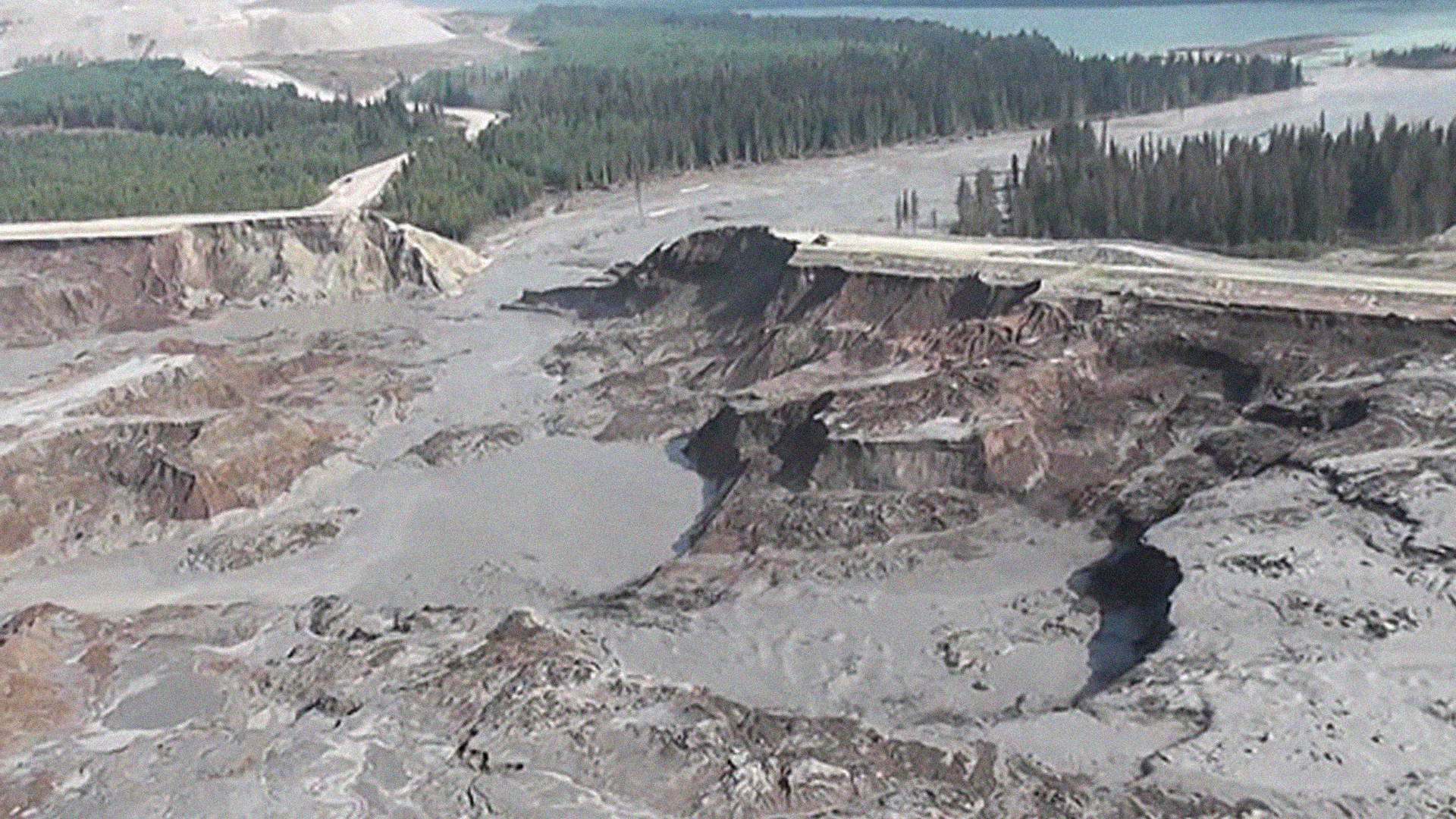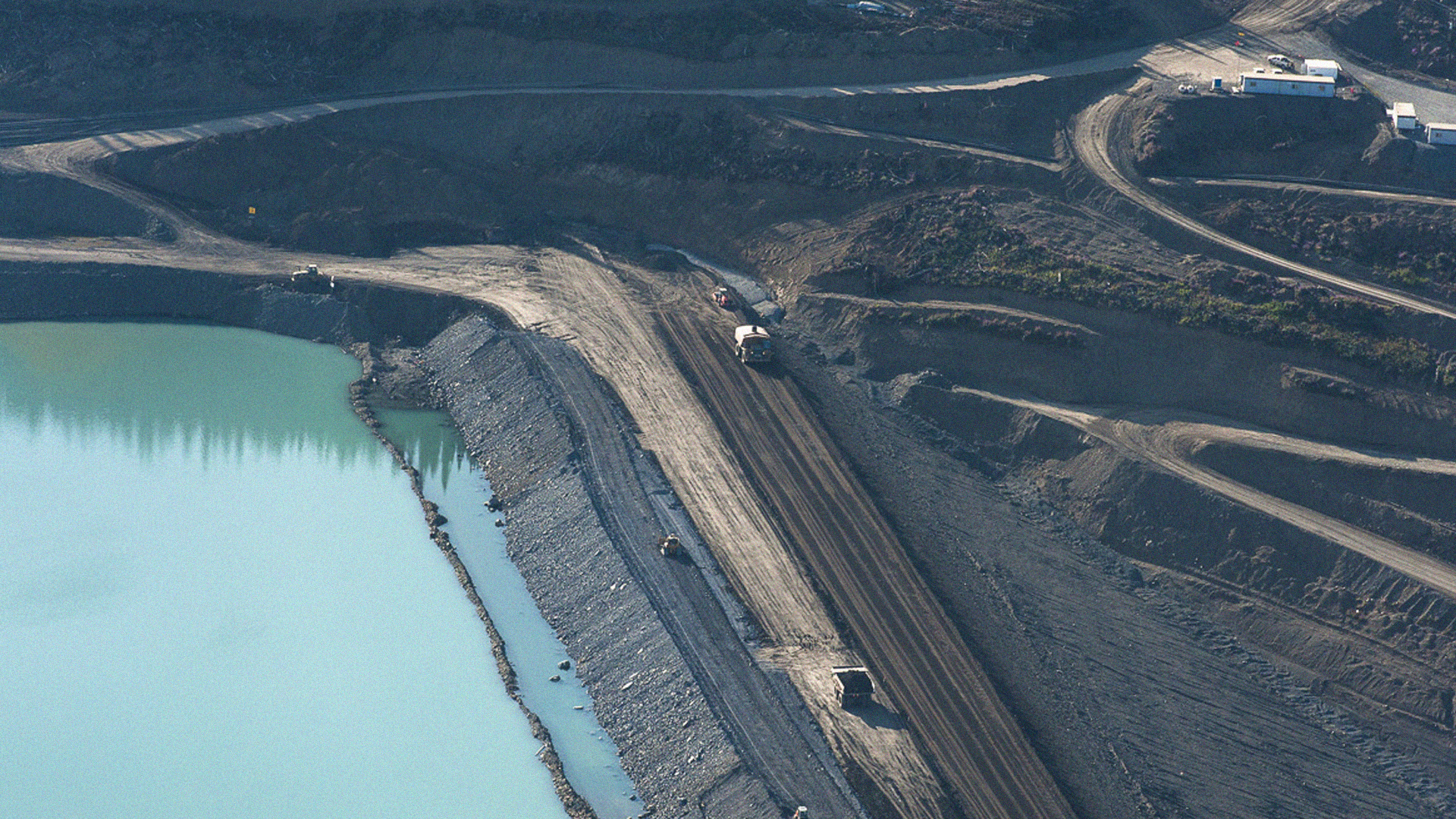The company responsible for the Mount Polley mine spill—one of the largest environmental disasters in Canadian history—has found out it’s not going to face any charges in British Columbia.
The news likely has billionaire Murray Edwards, owner of Imperial Metals and the Mount Polley mine (and the Calgary Flames) toasting with his rich friends in London (where he lives to avoid paying taxes).
Videos by VICE
If you’re not in BC, there’s a chance the aerial images of the disaster haven’t already scarred you forever. This is what the collapsed tailings pond at the Mount Polley mine looked like in August 2014.

The resulting spill was so enormous it lasted for 12 hours and, according to those who lived nearby, sounded as loud as a jet plane flying low overhead. The force of the 24 million cubic metres of mine waste, containing mercury, arsenic, selenium, copper, and other heavy metals, scoured the former Hazeltine Creek, tearing a 150-metre strip of forest clean from its roots.
Although a superficial cleanup of the creekbed has since taken place, the contaminated mine waste that entered Quesnel Lake—the source of drinking water for residents of Likely, BC, and home to about a quarter of the province’s sockeye salmon population—remains there to this day.
And while researchers studying the effects of the contamination on the lake and its fish say they need a few more years before they’ll fully understand the spill’s long-term impacts, the deadline for criminal charges to be laid under BC’s laws has already come and gone.
The door closed once and for all last week when the BC Prosecution Service announced it was staying charges filed against the company by Bev Sellars, the former chief of the Xat’sull (Soda Creek) First Nation in whose territory the spill occurred.
Back in August when Sellars realized the province wasn’t going to lift a finger to hold the company responsible for the spill, she decided she’d do it her own damn self and filed a private prosecution.
But after reviewing her case, which claimed Mount Polley violated 15 laws under BC’s Environmental Management and Mining Acts, prosecutors decided against seeking charges.
“The two reasons they gave for quashing the case was that it’s not in the public’s interest and they needed more evidence,” Sellars told VICE.
“I was shocked. I don’t understand how they can say there wasn’t enough evidence,” Sellars said. “Anyone can go out there or look online and see there was a spill.”
“This is setting a dangerous precedent.”
The BC Prosecution Service told VICE an investigation by the BC Conservation Service Office is ongoing but declined to comment further.
“There is an ongoing investigation that’s continuing but because of that we can’t speak too much to the specifics of the investigation,” Alisia Adams, spokesperson for the Prosecution Service, said.
BC Green party environment critic Sonia Furstenau said there is a lot of work to do to restore a sense of trust in British Columbians when it comes to the mining industry.
“There are so many examples in BC of mining companies that come in, extract the resources, extract the profits from it and then they walk away. They’re gone and it falls to government and taxpayers to clean up that mess,” Furstenau told VICE.

Canada has had seven tailings spills in the last ten years—the second-worst record in the world, just after China. There are currently 120 tailings ponds across BC and the independent panel that reviewed the Mount Polley spill estimated BC could expect about two additional tailings dam failures every ten years if better practices aren’t required (like moving away from building giant liquid waste pits, for one).
So far, BC has been criticized for introducing superficial changes to mining rules, which were written nearly 160 years ago. A major recommendation by an expert panel to end the practice of using wet tailings ponds has been largely ignored in BC.
“We absolutely need an update to the laws that govern mining in this province,” Furstenau said. “I think we’re talking about laws that were made in literally an entirely different era and don’t take in to account the reality of what BC is today.”
And Canada has a dismal record when it comes to actually making polluters pay. To see how other jurisdictions handle things like giant toxic spills we need look no further than the US.
In 2016 a massive sinkhole opened up under a tailings pit at a Florida fertilizer manufacturer, causing millions of litres of waste to spill into an underlying aquifer. The company was fined $2 billion USD for improper hazardous waste management.
Although Mount Polley may be one of Canada’s most notorious mines (and yeah, it’s back up and running with a new permit to pump mine waste directly into Quesnel Lake now) it’s a pipsqueak compared to other mines getting up and running in northwestern BC, home to some of the world’s largest untapped gold and copper reserves.
In fact, not long after the Mount Polley mine spill, Imperial Metals got the go-ahead to open up the much larger Red Chris mine, which has a liquid tailings pond that holds seven times the volume of Mount Polley.
The tailings facility for the KSM mine—another mine proposed for the same region—will hold more than 27 times the toxic gunk than the Mount Polley tailings dam did and will be 239 metres tall, which makes it higher than the tallest building in Vancouver. Originally, miners at KSM were going to have to dig under a glacier to get at a giant deposit of gold, but now that glacier has retreated (high-five to climate change).
There are at least 11 mines in various stages of development the region, which sits directly on the border with Alaska.
“The mines that are going up in BC drain right down in Alaska,” Sellars said. “Alaskans are worried.”
Earlier this week, a Lieutenant Governor and Senator from Alaska were in Ottawa pleading for someone, anyone, to deal with the risk BC mines pose to the state’s watersheds and salmon and, you know, way of life.
Ugo Lapointe, executive director of MiningWatch Canada, said what’s happened in BC is disconcerting.
“Something is wrong with BC laws. Something needs to change,” Lapointe told VICE. “If BC’s laws are too weak to bring about charges with such a disaster, it tells us that those laws need to be fixed at some level.”
In late 2016 Lapointe filed a private prosecution against Imperial Metals, Mount Polley and the government of British Columbia at the federal level. Those charges were stayed in early 2017.
But, Lapointe said, under the federal Fisheries Act, which prevents the pollution of fish bearing waters, charges can be brought for another 18 months. He’s hopeful the federal prosecution service will resuscitate his charges or bring a case of their own.
A spokesperson for the BC Ministry of Environment, David Karn, said the results of the ongoing investigation in BC will be considered at the federal level.
“The Public Prosecution Service of Canada will consider all of the information gathered during the course of this investigation, should charges be recommended under the Fisheries Act or other legislation,” Karn said in an emailed statement.
Holding the company accountable would help fight against the perception that there’s rules for mining companies and then rules for the rest of us, Kai Nagata, communications director at the BC-based democracy advocacy organization Dogwood, told VICE.
“In this case you’re dealing with literally a billionaire in London, who moved out of Canada to pay less tax…so you have this very 19th century situation where a rich guy in England runs a mine in the colony that is exempt or not accountable to local people.”
“I think it’s time to take a really close look at the rules that govern mines in BC and update them to a standard that reflects all the progress we’ve made over the last 150 years.”
Follow Carol Linnitt on Twitter.
More
From VICE
-

(Photo by Bryan Steffy/Getty Images for Complex) -

(Photo by Sam Tabone/Getty Images) -

Photo: Niloo138 / Getty Images -

Photo: Naypong / Getty Images
